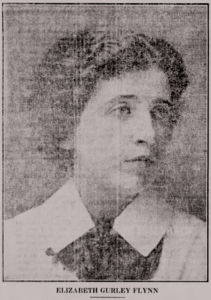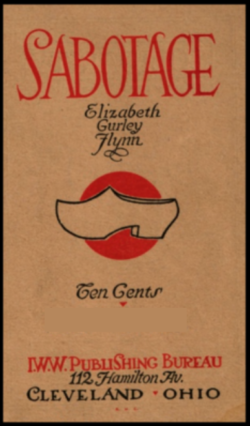This is one of the great battles
for the members of the working class
and we must stand by our boys.
They fought for us.
-Elizabeth Gurley Flynn
Hellraisers Journal, Friday March 2, 1917
From the Industrial Worker: Miss Flynn Speaks for Everett Prisoners

The Everett Defense News Letter of February 17th reported that Elizabeth Gurley Flynn had recently returned from a speaking tour on behalf of the Everett Prisoners’ Defense Committee:
MISS FLYNN HAS
SUCCESSFUL TOUR.Elizabeth Gurley Flynn has just returned from a speaking trip through Washington, Oregon, Idaho and part of Montana in the interests of the Defense of the 74 victims of Bloody Sunday. Every where the workers have heard eagerly the facts of the tragic and brutal massacre of November 5th and have given willingly of their time, energy and money to help set free our imprisoned fellow workers. Miss Flynn will now be engaged until the trial in the State of Washington and, more especially, in King County.
The Industrial Worker of February 17th offers a report on the speech given by Miss Flynn in Yakima, Washington, during that tour:
IN COLD FOR TWO HOURS.
—–
Once in a while a reporter tells the truth and the editor, being sleepy or tired, lets it go over. In what other way can we account for the extremely fair statement of the Gurley Flynn meeting given by the Yakima Republican:
Two hours is a long time to listen to any one speaker. It is a long time when one sits on the comfortable, fatly-cushioned seats of a theatre. It is still longer when one sits on the hard, wooden benches of the I. W. W. hall. And when one stands, without overcoat, on the streets to hear the stray phrases and sentences which come thru a crowded, narrow doorway, the time is long, indeed.
Yet 650 persons last night sat for two hours, on hard wooden benches, and sat tense and still, to hear Elizabeth Gurley Flynn’s defense of the I. W. W. movement. A hundred or more others, unable to wedge themselves into the hall or doorway, shivered on the street as they stood to hear the lecture. Miss Flynn’s voice carried well and they heard most of the address. They heard enough to make them stay to the end of the two-hour appeal.
Plea for I. W. W.
Miss Flynn is a living contradiction to all preconceived ideas of I. W. W. speakers and leaders. Young, with the typical black, wavy hair and blue eyes of Irish beauties, she has none of the mannerisms which one might expect from a woman with her long record as a strike worker. The pictures of her which have been displayed in the city are a libel; she looks no older than her 26 years and has a smile of rare sweetness. “Ranting” is quite the last adjective one would apply to her manner of speech and, noting the effect she produced on her motly [motley?] audience, there is little wonder that Collier’s magazine, which is not given to over-praise, calls her the “finest woman speaker in the United States.”
Her address was a plea for justice for the I. W. W., “our boys,” who are awaiting trial as the result of Everett’s “Bloody Sunday.” It was so effective, in its simplicity and sincerity, that the collection for “the cause” at the close amounted to $179-and that from an audience which the average person would describe as made up of “down and outers.”
“Fellow Worker.”
At no time did “Gurley Flynn,” as she is most often called, appear more at home than when the ragged men crowded close about her to shake her hand and greet her as “fellow worker” and “comrade.” It is at those times that her smile has the brooding tenderness with which a mother croons over her sleeping child.
Gurley Flynn’s account of the Everett fight and that given by the officers are far apart. “It all started so long ago,” she said, in giving a brief outline of her address.
It was a movement on the part of the Everett citizens of the capitalistic class to keep the workingmen from organizing to secure their rights. The immediate trouble started when they passed a rule that there should be no street speaking. It was aimed at the I. W. W. Speakers from every other class and organization were allowed to speak unmolested; every I. W. W. was shoved into jail. Was it fair? Is not this a country of free speech, as long as that speech is not treasonous or libelous? Is it either to protest that one is not getting enough to eat and that others are reaping the profit of one’s labor? Where is the crime?
“Bloody Sunday.”
On that Sunday the I. W. W. came over from Seattle and other cities to make one last effort to secure the right of free speech-their right as citizens of the United States. They gave notice of their going. Would they have done that if they were planning murder? At Everett several hundred citizens had been deputized and carried arms. These met them and then-battle. Five of our boys, such splendid, fine young fellows of the migratory workers’ class, were killed. Nobody is being tried for their murder. Why not? Two of the deputies were killed, one surely by the fire from his fellow-deputies. The boys in jail are being tried for the murder of one deputy, but it is impossible for them to get a square deal in Everett. The capitalistic class is banded together for a last stand. We won a great victory when we secured a Seattle judge, and now we are trying for a change of venue [since granted]. This is one of the great battles for the members of the working class and we must stand by our boys. They fought for us.
What Is Sabotage?
During North Yakima’s I. W. W. troubles, no one word was more in dispute than “sabotage.” Gurley Flynn uses it frequently.
[Says the woman who wrote the I. W. W. textbook on the subject:]
Sabotage is primarily the withdrawal of efficiency. It means either to slacken up and interfere with the quantity or to botch in your skill and interfere with the quality. Employers continually use sabotage when they interfere with the quality of the goods they sell for the purpose of increasing their profit. Sabotage is an absolute necessity for the workingman. It never means the destruction of life or the permanent destruction of life or the permanent destruction of property, but it is the workingman’s best weapon against the pocketbook of his boss, which is his heart.
———-
[Photograph added.]
A letter to the Industrial Worker from Sand Point, Idaho:
CLOSED SHOPS TO HEAR FLYNN.
—–
SAND POINT, Ida.-Sand Point Local is not asleep; it is one of the livest locals in the west. The [lumber] jacks are all talking about the I. W. W. wherever they congregate, and the talkers are also actors and wear the button wherever they go to prove it. Those who do not wear the button are getting more and more in the minority as every day there is a bunch lining up.
We have here a corps of delegates here that are as efficient as any in the United States. I have just returned from a camp where the I. W. W. has a ninety-five per cent organization, and it can be imagined how comfortable things are for the five per cent who are unorganized.
The town went wild over the Gurley Flynn meeting. There was a holiday in town. The business men closed up their places as their workers all wanted to go to the Flynn meeting. The hall was packed and her talk made a decided hit. The collection was $140 and the literature sales were $21.00.
WILLIAM HARDY.
———-
[Photograph added.]
SOURCES
Hellraisers Journal, Tuesday February 20, 1917
Everett Defense News Letter No. 12: Caroline A. Lowe Comes to Aid of Class-War Prisoners
https://weneverforget.org/hellraisers-journal-everett-defense-news-letter-no-12-caroline-a-lowe-to-come-aid-of-class-war-prisoners/
Industrial Worker
(Seattle, Washington)
-Feb 17, 1917
https://libcom.org/files/Industrial%20Worker%20(February%2017,%201917).pdf
IMAGES
EGF, Everett Northwest Worker, Jan 18, 1917
https://www.newspapers.com/image/64453745
Sabotage by Elizabeth Gurley Flynn
https://babel.hathitrust.org/cgi/pt?id=mdp.39015079021849;view=2up;seq=1;size=75
IWW Button, libcom Sioux City FSF 1915
http://libcom.org/files/The%20Sioux%20City%20Free%20Speech%20Fight.pdf
See also:
Industrial Worker
Report by Chris Perry and Victoria Thorpe
http://depts.washington.edu/labhist/laborpress/Industrial_Worker.htm
The Everett Massacre
A History of the Class Struggle in the Lumber Industry
-by Walker C. Smith
IWW, 1918
https://catalog.hathitrust.org/Record/001106557


